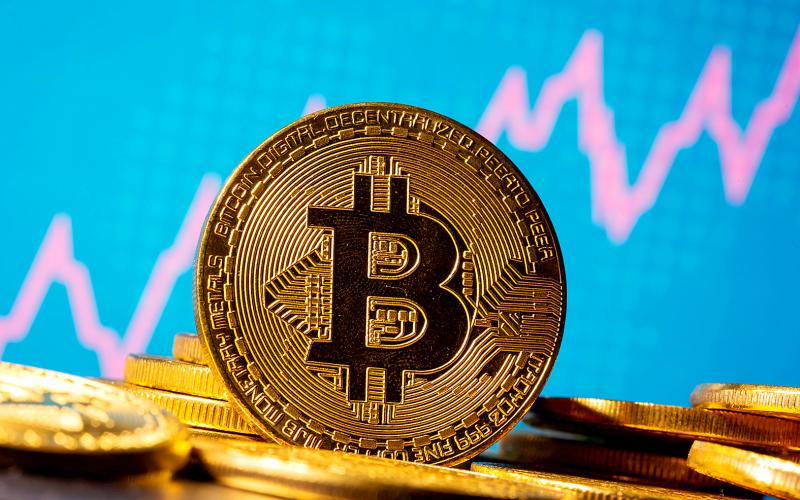Bitcoin, the world’s largest cryptocurrency, topped US$34,000, just weeks after passing another major milestone.
The currency gained as much as 7.8 percent to US$34,182.75, before slipping to about US$33,970 as of 3:05pm yesterday in Singapore. It advanced almost 50 percent last month, when it breached US$20,000 for the first time.
The latest gains top an eye-popping rally for the controversial digital asset, which rebounded sharply after a severe crash in March last year that saw it lose 25 percent amid the COVID-19 pandemic.

Photo: Reuters
The currency “will be on the road to US$50,000 probably in the first quarter of 2021,” said Antoni Trenchev, managing partner and cofounder of Nexo in London, which bills itself as the world’s biggest cryptocurrency lender.
Institutional investors returning to their desks this week will likely boost prices further after retail buying over the holidays, he said.
Bitcoin has increasingly been “embraced in more global investment portfolios as holders expand beyond tech geeks and speculators,” Bloomberg Intelligence commodity strategist Mike McGlone wrote in a note last month.
Proponents of the currency have also seized on the narrative that the coin could act as a store of wealth amid supposed rampant money printing by central banks, even as inflation remains mostly muted.
Bitcoin should eventually climb to about US$400,000, Guggenheim Investments chief investment officer Scott Minerd told Bloomberg Television in an interview on Dec. 16 last year.
Still, there are reasons to be cautious, partly because cryptocurrencies remains a thinly traded market.
Bitcoin slumped as much as 14 percent on Nov. 26 amid warnings that the asset class was overdue for a correction. A big run-up in price in 2017 was followed by an 83 percent rout that lasted a year.

Sweeping policy changes under US Secretary of Health and Human Services Robert F. Kennedy Jr are having a chilling effect on vaccine makers as anti-vaccine rhetoric has turned into concrete changes in inoculation schedules and recommendations, investors and executives said. The administration of US President Donald Trump has in the past year upended vaccine recommendations, with the country last month ending its longstanding guidance that all children receive inoculations against flu, hepatitis A and other diseases. The unprecedented changes have led to diminished vaccine usage, hurt the investment case for some biotechs, and created a drag that would likely dent revenues and

Global semiconductor stocks advanced yesterday, as comments by Nvidia Corp chief executive officer Jensen Huang (黃仁勳) at Davos, Switzerland, helped reinforce investor enthusiasm for artificial intelligence (AI). Samsung Electronics Co gained as much as 5 percent to an all-time high, helping drive South Korea’s benchmark KOSPI above 5,000 for the first time. That came after the Philadelphia Semiconductor Index rose more than 3 percent to a fresh record on Wednesday, with a boost from Nvidia. The gains came amid broad risk-on trade after US President Donald Trump withdrew his threat of tariffs on some European nations over backing for Greenland. Huang further

Macronix International Co (旺宏), the world’s biggest NOR flash memory supplier, yesterday said it would spend NT$22 billion (US$699.1 million) on capacity expansion this year to increase its production of mid-to-low-density memory chips as the world’s major memorychip suppliers are phasing out the market. The company said its planned capital expenditures are about 11 times higher than the NT$1.8 billion it spent on new facilities and equipment last year. A majority of this year’s outlay would be allocated to step up capacity of multi-level cell (MLC) NAND flash memory chips, which are used in embedded multimedia cards (eMMC), a managed

CULPRITS: Factors that affected the slip included falling global crude oil prices, wait-and-see consumer attitudes due to US tariffs and a different Lunar New Year holiday schedule Taiwan’s retail sales ended a nine-year growth streak last year, slipping 0.2 percent from a year earlier as uncertainty over US tariff policies affected demand for durable goods, data released on Friday by the Ministry of Economic Affairs showed. Last year’s retail sales totaled NT$4.84 trillion (US$153.27 billion), down about NT$9.5 billion, or 0.2 percent, from 2024. Despite the decline, the figure was still the second-highest annual sales total on record. Ministry statistics department deputy head Chen Yu-fang (陳玉芳) said sales of cars, motorcycles and related products, which accounted for 17.4 percent of total retail rales last year, fell NT$68.1 billion, or